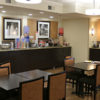You are wandering in a place which is thousands of miles from home. You had a full day of seeing the sights and mingling with the local people. You are tired; and you are hungry. You pass by some of the establishments which are located in an area known for tourism…
Stupid Tip of the Day: Avoid Patronizing Eateries With Aggressive Sales Pressure Tactics
…and the proprietor of the establishment approaches you to greet you in broken English as you pass his restaurant: “Hello, sir or madam! Where are you from?”
The sales pressure tactics tend to increase as you move forward — whether or not you let him know where you are from: “I have wonderful special tonight, just for you.” He acts like he is your best friend and is looking out for your interests — convincing you that no other place is like his. He might even convince you of a celebrity or other famous person who dined in his place. Show one slight hint of hesitation — as if a glint of interest actually entered your mind for even only a nanosecond — and he is in for the kill.
At this point, you have two choices: keep going; or succumb to what will almost certainly amount to be a poor experience.
My Experience
This type of incident happened to me years ago in Cyprus, where I was searching for a fish meze near the harbour of Paphos. I was fortunate to have witnessed a brilliant sunset; and I was hungry.
Although it is technically an appetizer, a meze is supposed to be a sampling of the native foods indicative of the country — in this case, Cyprus. Because of the potential amount of food which may be served, I was informed not to completely finish every course of a meze, as one may not have room to sample every course.
A meze can be for two persons; but after a high-pressure sales pitch, I was convinced by one of the proprietors of a particular restaurant that they will gladly create a fish meze for one.
Ultimately, all I received was a salad and a main course consisting of six small whole fish, two small filets of fish, and three portions of squid prepared three different ways — all on one plate — along with five different kinds of sauces and three slices of bread. I was completely unimpressed by the food — and that is an understatement. With a small glass of cola, the total bill was CY£11.00, or US$25.46.
Even worse, they never informed me that my meal had concluded — nor had they brought me my bill. I wound up waiting a long time before I finally asked if there were any other courses forthcoming, to which one of them replied “no.” I guess having a warm body in a seat in the restaurant — which was mostly empty anyway — for as long as possible was better for potentially attracting more customers for business.
The only positive hightlight of my experience was that the restaurant had a real live pelican that was rather entertaining. After I sat down, the pelican was brought out to try to attract customers, which unfortunately gave me an obvious clue to avoid eating there — albeit too late. The pelican did try to playfully eat my arm after a cat meowed at me incessantly for some food — but sadly, the pelican was merely another marketing gimmick.
I left the restaurant hungry and dissatisfied, with a feeling of being cheated because I was denied my one opportunity to sample an authentic Cyprus meze. I vowed never to allow that to happen to me ever again.
Summary
Every time I pass a proprietor of an establishment who is basically the equivalent of a tout, I think of that restaurant in Cyprus — and I have not endured another experience like that one ever again.
A restaurant, café, or other type of eatery should basically sell itself with its reputation for good food, excellent service, and fair value. If someone tries to use aggressive sales tactics to do whatever he can do to get your posterior in one of the seats of his establishment, that is usually an obvious warning that either the food is subpar; the prices are way too expensive; the service is nonexistent — or perhaps any combination thereof.
The proprietors of these dining establishments do not care about return business, as there is always some other uninitiated sucker whom they can reel in — nor do they care about their contribution to tarnishing the overall reputation of the country in which they are located.
One bonus red flag for which to watch out is when a large menu displayed at the entrance — or one of multiple pages hanging from a chain — has poor photographs of every single menu item; and each item is named and described in several different languages.
In fact, the aforementioned warning signs can apply to virtually any type of establishment — including shopping for souvenirs, of which I impart 7 tips of advice.
You are cordially invited to impart similar experiences which you may have had in the Comments section below, as I am curious to read your stories.
Photograph ©2018 by Brian Cohen.

